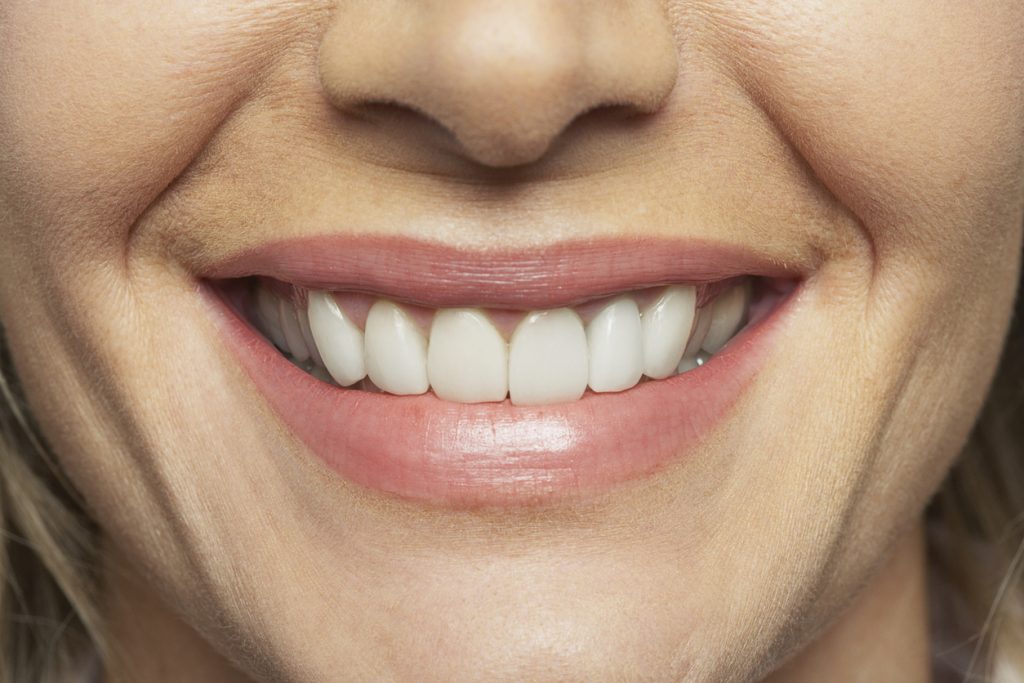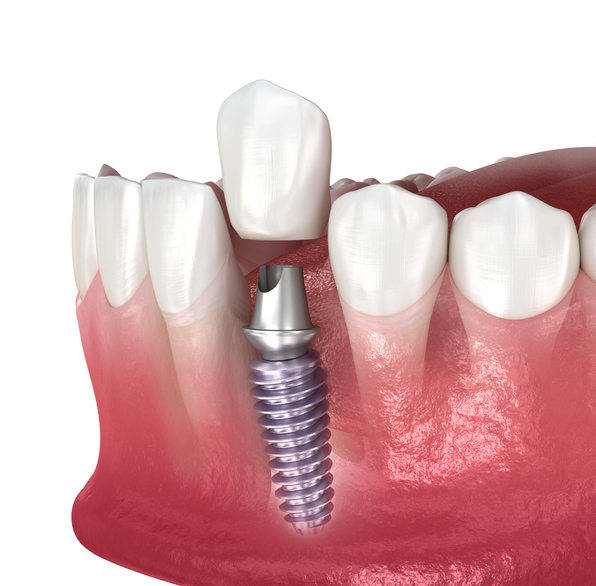
Dental implants have revolutionized dentistry, offering a permanent solution for individuals dealing with missing teeth. There are two main parts of dental implants, the implanted post (root) and the crown (tooth). Among the various types of dental implants, three stand out: endosteal implants, subperiosteal implants, and zygomatic implants. There are also four commonly used materials for the dental crown – porcelain (ceramic), zirconia, lithium disilicate, and gold. In this article, we will look into the unique features of each type of implant and crown, helping you make an informed decision about the best dental implant for your specific needs.
Endosteal Implants
Endosteal implants are the most common and widely used type of dental implants. These implants are surgically placed directly into the jawbone, providing a stable foundation for prosthetic teeth. The process involves two surgeries – the first to embed the implant into the jawbone and the second to attach the artificial tooth.
Advantages of Endosteal Implants
- High Success Rate: Endosteal implants have a proven track record of success, with a success rate exceeding 95%.
- Natural Look and Feel: These implants closely mimic the appearance and functionality of natural teeth, ensuring a seamless blend with the existing dentition.
- Long-Lasting: With proper care and maintenance, endosteal implants can last a lifetime, making them a durable and reliable option.
Subperiosteal Implants
Subperiosteal implants are an alternative for individuals who lack the necessary bone structure for traditional endosteal implants. Instead of being placed within the jawbone, subperiosteal implants rest on top of the jawbone but underneath the gum tissue. This type of implant is often recommended for those who cannot undergo bone grafting procedures.
Advantages of Subperiosteal Implants
- Suitable for Bone Loss: Subperiosteal implants are an excellent option for individuals with moderate to severe bone loss as they don’t require extensive bone support.
- One-Stage Surgery: Unlike endosteal implants, subperiosteal implants involve a single surgery, reducing overall treatment time.
- Customizable Design: These implants can be customized to fit the unique shape of the patient’s jaw, providing a tailored and comfortable fit.
Zygomatic Implants
Zygomatic implants are designed for individuals with significant bone loss in the upper jaw. Rather than anchoring into the jawbone, zygomatic implants are affixed to the zygomatic (cheek) bone, providing a stable base for dental restorations.
Advantages of Zygomatic Implants
- Effective Solution for Bone Loss: Zygomatic implants are an ideal option for patients with extensive bone loss in the upper jaw, eliminating the need for bone grafting.
- Reduced Treatment Time: Similar to subperiosteal implants, zygomatic implants typically involve a one-stage surgery, streamlining the treatment process.
- Improved Quality of Life: Zygomatic implants offer a reliable and long-lasting solution, enhancing the overall quality of life for individuals with severe dental issues.
Choosing the best dental implant depends on various factors, including the extent of bone loss, overall health, and personal preferences. Endosteal implants, subperiosteal implants, and zygomatic implants each have their unique advantages, providing viable options for individuals seeking a permanent solution for missing teeth. Consultation with a qualified dental professional is crucial to determine the most suitable implant type based on individual circumstances, ensuring a successful and satisfying outcome.
Dental Crowns
A dental implant represents just one facet of the comprehensive solution for tooth or teeth replacement. Its counterpart, the visible and functional component completing the ensemble, is the crown. We will touch on four commonly used materials for dental crowns – porcelain (ceramic), zirconia, lithium disilicate, and gold. We will shed light on their characteristics to help you make an informed decision when considering dental implant restorations.

Porcelain (Ceramic) Crowns
Advantages
- Aesthetic Appeal: Porcelain crowns closely mimic the natural appearance of teeth, providing a lifelike and aesthetically pleasing result.
- Biocompatibility: Porcelain is a biocompatible material, minimizing the risk of allergic reactions or irritation in the surrounding tissues.
- Stain Resistance: Porcelain crowns are highly resistant to staining, ensuring a long-lasting bright, and natural appearance.
Disadvantages
- Brittle: Porcelain crowns are more prone to chipping or cracking compared to other materials, especially when exposed to excessive force.
- Wear on Opposing Teeth: Porcelain may cause more wear on the opposing teeth due to its hardness.
Zirconia Crowns
Advantages
- Strength and Durability: Zirconia is known for its exceptional strength and durability, making it a suitable choice for posterior teeth that endure greater biting forces.
- Biocompatibility: Zirconia is biocompatible, reducing the risk of adverse reactions in the oral environment.
- Minimal Tooth Reduction: Zirconia crowns often require less tooth reduction during preparation, preserving a more natural tooth structure.
Disadvantages
- Aesthetics: While zirconia crowns have improved in terms of aesthetics, they may not offer the same translucency as porcelain, which could impact their natural appearance.
- Limited Adjustability: Zirconia crowns may be challenging to adjust once they are in place.
Lithium Disilicate Crowns
Advantages
- Strength and Aesthetics: Lithium disilicate combines strength with excellent aesthetics, making it a versatile and popular choice for dental crowns.
- Minimal Tooth Reduction: Similar to zirconia, lithium disilicate crowns often require less tooth reduction, preserving more of the natural tooth structure.
Disadvantages
- Cost: Lithium disilicate crowns can be more expensive compared to other materials.
- Potential for Fractures: While highly durable, lithium disilicate may be susceptible to fractures in certain situations, especially in individuals with bruxism (teeth grinding).
Gold Crowns
Advantages
- Biocompatibility: Gold is a biocompatible material that rarely causes allergic reactions or irritation in the oral tissues.
- Minimal Tooth Reduction: Gold crowns require minimal tooth reduction during the preparation process.
Disadvantages
- Aesthetics: Gold crowns are conspicuous and may not be the preferred choice for visible areas in the smile.
- Cost: Gold crowns can be more expensive than other materials.
Choosing the right material for your dental crown involves considering a combination of factors, including aesthetics, strength, durability, and cost. Consult with Dr. Scharf to assess your specific needs, and together, you can make an informed decision to ensure a successful and aesthetically pleasing dental implant restoration.
Final Thoughts
There is a diverse array of dental implant and crown options to restore your smile and improve your oral health. The choice between endosteal, subperiosteal, and zygomatic implants depends on individual circumstances, with each type offering unique advantages to cater to specific needs. The journey towards a complete and functional smile doesn’t end with implants alone; the selection of the right dental crown material is equally crucial.
Porcelain (ceramic) crowns provide a natural look, but their susceptibility to brittleness and potential wear on opposing teeth must be considered. Zirconia crowns, known for strength and durability, may lack the translucency of porcelain. Lithium disilicate crowns offer a blend of strength and aesthetics but come at a higher cost. Gold crowns, while biocompatible and requiring minimal tooth reduction, might be less preferred in visible areas due to their conspicuous appearance.
Ultimately, consulting with a qualified dental professional, such as Dr. Scharf, is key to making informed decisions tailored to your unique situation. With their expertise, you can navigate the nuances of dental implants and crowns, ensuring a successful and aesthetically pleasing restoration that enhances both your smile and overall quality of life. Embrace the transformative power of modern dentistry, and embark on a journey toward a confident and radiant smile that stands the test of time.

Schedule a Consultation
Are you looking for top-quality dental implants in Long Island, NY? Sit down with Dr. Scharf for a consultation to discover the dental implants and crowns best suited to your needs.
